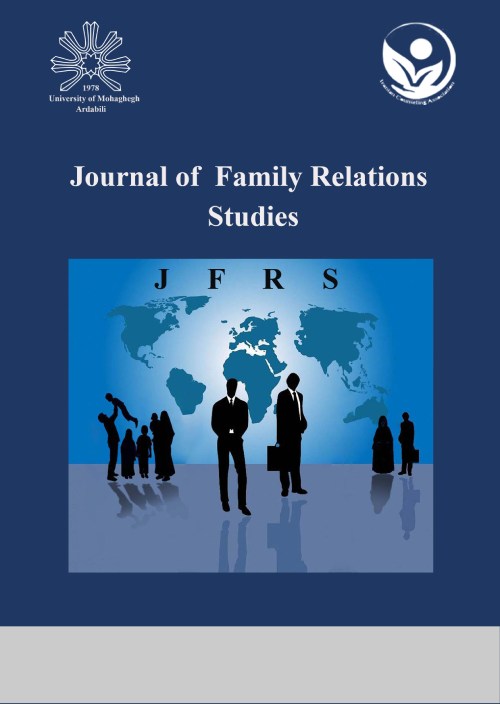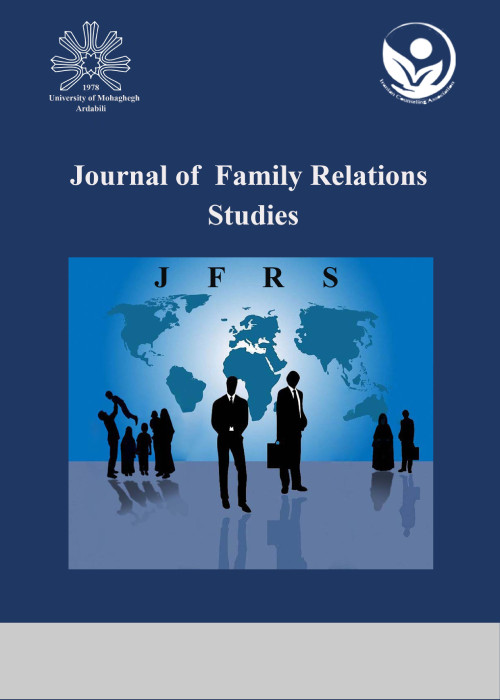فهرست مطالب

Journal of Family Relations Studies
Volume:2 Issue: 7, Nov 2022
- تاریخ انتشار: 1401/09/30
- تعداد عناوین: 6
-
-
Pages 4-9ObjectiveMarital relationship quality is a very important aspect in the relationship of couples and plays an important role in marital conflicts. Therefore, the present study was conducted to determine the mediating role of triangulation with children in the relationship between attachment style and marital relationship quality.MethodsThe research method was descriptive, which was carried out in the form of path analysis. In order to conduct this research, 180 married people were selected from the counseling centers of Ardakan city by simple random sampling and the research tools included marital relationship quality questionnaire, adult attachment style scale and triangulation questionnaire. They answered the collected data were analyzed through AMOS software.ResultsThe results of the research showed that ambivalent and avoidant attachment styles have a positive and significant relationship with triangulation and triangulation also has a negative and significant relationship with the marital relationship quality. Also, secure (0.567), ambivalent (-0.454) and avoidant (-0.433) attachment style have a significant relationship with the marital relationship quality. The results of investigating indirect relationships also indicated that the mediating role of triangulation with children was significant in the relationship between avoidant and ambivalent attachment styles with marital relationship quality.Conclusionattachment style can affect the quality of marital relationship in conflicted couples by influencing triangulation with children. Therefore, it is necessary to pay attention to the underlying factors of psychological separation between couples.Keywords: triangulation, Attachment styles, marital relationship quality, couples
-
Pages 10-19Objective
The aim of the study was to investigate the effect of organizational support on life satisfaction and job satisfaction of female coaches in Isfahan with the mediating role of work-family conflict.
MethodsIt was a descriptive – field study and a practical one. The research population was female coaches in Isfahan and 206 coaches in sport complexes were selected through convenience sampling. Cammann’s questionnaire (1983) was used to evaluate job satisfaction, and Diener et al.'s (1985) questionnaire was used to measure life satisfaction. Netemeyer et al.’s questionnaire (1996) was used to assess work-family conflict, and organizational support scale of Eizenberger et al. (1996) was used for measuring organizational support. The reliability of questionnaire was confirmed by Cronbach’s alpha; and content, face and structural validity were also conducted to investigate the questionnaire validity. To measure the validity and fitness of the model, structural equation modeling by AMOS20 has been applied.
ResultsThe findings demonstrated that “Organizational support” had a significant effect on “work-family conflict” (β= -0.37), “Job satisfaction” (β= 0.54), “Life satisfaction” (β= 0.48). In addition, “work-family conflict” had a significant effect on “Job satisfaction” (β= -0.31), and “Life satisfaction” (β= -0.26). Moreover, the Sobel test confirmed the role of the mediating variable. The fit indices also confirmed the research model fitness.
ConclusionAccording to the role of organizational support in decreasing the work-family conflict as well as the effect of work-family conflict on job satisfaction and life satisfaction, to pave the way for presence of females in sport field, sports organizations should plan their strategies by focusing on the concepts and results of this research.
Keywords: Organizational Support, life satisfaction, job satisfaction, Female Coaches, Work-Family Conflict -
Pages 20-28ObjectiveUnmanaged stress during parenthood can lead to poor performance of the family and inappropriate parenting in general. Therefore, it is necessary to identify optimal methods of dealing with stress.MethodsThe present qualitative study was based on a grounded theory approach. The population included women (living in Tehran in 2021), who were satisfied with their lives and had at least one 6-year old child. After the initial investigation, from among 51 women, 11 women whose level of satisfaction with life was above the mean were selected through purposive sampling method. The research instrument included Diener's (1985) Satisfaction with Life scale and semi-structured interviews. The data obtained from the interview were analyzed through Strauss and Corbin’s method.ResultsThe qualitative analysis of the interviews showed that satisfied women used strategies, such as preventing the spread of the problem, changing the situation, self-empowerment in processing negative emotions, communication activism, educational activism, conscious problem solving, and seeking professional help to deal with their maternal stress. The central factors included not giving up, solving the problem and activism to solve it. The causal factors included worrying about child's developmental delay/ developmental disorders, financial pressure, and role density/ role conflict. The underlying factors included agreement or disagreement in spouses' training methods, dynamism and activism, modeling and gaining experience, persistence and perseverance, feeling self-inefficiency in training, realism/ perfectionism, mother's independent personality/ feeling lonely, and living in the present time/ worrying about the future. The intervening factors included unwanted pregnancy/ spouse’ unwillingness to have children, perceiving the ineffectiveness of the efforts, comparing the growth of peers, worrying about providing facilities for the child's growth, and weakness in emotional regulation/ depression. The facilitating factors included the calmness of the child, the mother's personal space and recreation, the support of the spouse and families, and the mother's openness to experience. Finally, the consequences of coping with maternal stress included managing the emotions of the mother and the child, the child's taking responsibility, the enrichment of the marital relationship, the intimate relationship/ acceptance, and parents’ acceptance of the child and their companionship.ConclusionThe results of the current study can be the basis for future studies. It can also assist formulating educational and therapeutic programs aimed at dealing with the stress caused by the birth of the first child.Keywords: maternal stress, satisfaction with life, coping with stress, satisfied women, grounded theory approach
-
Pages 29-36ObjectivePurpose of this research was investigation of how effects of marriage and poor sexual performance.MethodsBased on the theoretical sampling method, 20 women who were diagnosed breast cancer in Tehran city were chosen and individually had structured interviews. The data analysis was done by using the phenomenological method and encoded texts from the interviews. The resultsof the study identified 2 centers categories and 7 main categories such as many sexual problems like vaginal dryness, pain during intercourse, sexual reluctance and etc. are caused by lack of knowledge, shyness, the male dominated society and lack of proper trainings. They don’t follow their treatment process and this can be the reason of so many problems in their relationships.They don’t even talk about their sexual problems for fear of being abandoned by their husbands and these women face with frustration due to the changes that had happened in their bodies. All these women have experienced at least one of the disgust factors as physical and emotional exhaustion, suffering physical exhaustion due to losing their breast, suffering emotional exhaustion after losing the support of their family and husbands, thoughts of death and end of life and fear of not returning the days before their diseases make them suffer mentally.ConclusionWomen in the studies believed that the most main threat to their life is losing their most important sex organ which is their breast.Keywords: marital boredom, sexual dysfunction, breast cancer
-
Pages 37-47ObjectiveThis study was conducted on the causal modeling of psychological well-being based on psychosocial development, and temperament and character patterns mediated by belief system in female adolescents.MethodsThe present study was a correlational research with structural equation modeling. The statistical population of this study consisted of all female students (12-18 years old) in year 2021-2022 in Urmia city. Data were collected through Ryff’s PWB scale, Hawley’s psychosocial development questionnaire, Cloninger’s Temperament and Character Inventory (TCI), and Holland’s system of belief inventory. To analyze data, PLS software was used.ResultsThe results confirmed the positive effect of temperament and character patterns on psychological well-being. In addition, it was confirmed that the relationship between psychological well-being and temperament and character patterns was mediated by belief system while such mediatory role was not confirmed in the relationship between psychosocial development and psychological well-being.ConclusionAccording to the results, psychosocial development, temperament and character patterns, and belief system play a role in the psychological well-being of female adolescentsKeywords: psychological well-being, psychosocial development, temperament, character patterns, Belief system, female adolescents
-
Pages 48-56Introduction
Care is a multidimensional concept that has been reflected in the process of modernity. The aim of this study is to investigate care ethics among female students of Guilan University.
MethodIn this research, a qualitative method based on semi-structured interviews and purposive sampling was used. The analysis method in this research is thematic analysis.
ResultsIn data analysis, twelve basic themes, three organizing themes, and one global theme were obtained. The first type is autonomous girls: These types of girls are less inclined to marriage and maternal roles and less interested in circular motherhood and more inclined to linear time and they believe that a circular mother is a boring role that will reduce their agency. The second is heteronomous girls: These types of female students are maximal motherhood because they have constructed a mother with the semiotic such as sacrifice, kindness, self-sacrifice, altruism, etc. Third type of girls are eclectic: This type of female student has both a tendency to linear time (employment and education) and a cyclical time (marriage and motherhood)
ConclusionAmong the existing types, the ideal form is eclectic ethics in which female students have two ethics of heteronomy and autonomy (semiotic and symbolic).
Keywords: Care Ethics, Motherhood, autonomy, Heteronomy, female students


